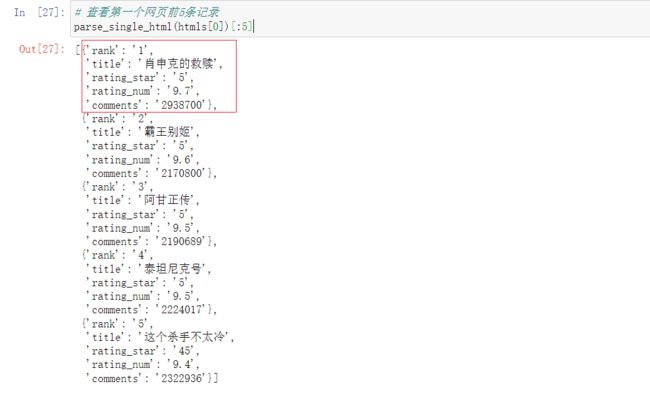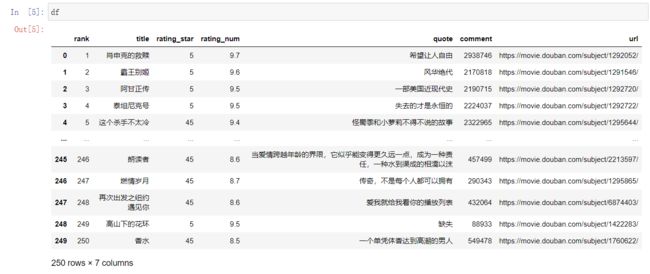教你用BeautifulSoup实现数据解析,并爬取豆瓣TOP250电影榜
5分钟使用Python爬取豆瓣TOP250电影榜
本视频的演示步骤:
- 使用requests爬取网页
- 使用BeautifulSoup实现数据解析
- 借助pandas将数据写出到Excel
这三个库的详细用法,请看我的其他视频课程
import requests
from bs4 import BeautifulSoup
import pandas as pd
`
# 1、下载共10个页面的HTML
# 构造分页数字列表
page_indexs = range(0, 250, 25)
[*range(0, 250, 25)]
list(range(0, 250, 25) )
def download_all_htmls():
"""
下载所有列表页面的HTML,用于后续的分析
"""
htmls = []
for idx in page_indexs:
url = f"https://movie.douban.com/top250?start={idx}&filter="
print("craw html:", url)
r = requests.get(url,headers={"User-Agent":"Mozilla/5.0 (Windows NT 10.0; Win64; x64) AppleWebKit/537.36 (KHTML, like Gecko)"})
if r.status_code != 200:
raise Exception("error")
htmls.append(r.text)
return htmls
htmls = download_all_htmls()
craw html: https://movie.douban.com/top250?start=0&filter=
craw html: https://movie.douban.com/top250?start=25&filter=
craw html: https://movie.douban.com/top250?start=50&filter=
craw html: https://movie.douban.com/top250?start=75&filter=
craw html: https://movie.douban.com/top250?start=100&filter=
craw html: https://movie.douban.com/top250?start=125&filter=
craw html: https://movie.douban.com/top250?start=150&filter=
craw html: https://movie.douban.com/top250?start=175&filter=
craw html: https://movie.douban.com/top250?start=200&filter=
craw html: https://movie.douban.com/top250?start=225&filter=
# 2、解析HTML得到数据
def parse_single_html(html):
"""
解析单个HTML,得到数据
@return list({"link", "title", [label]})
"""
soup = BeautifulSoup(html, 'html.parser')
article_items = (
soup.find("div", class_="article")
.find("ol", class_="grid_view")
.find_all("div", class_="item")
)
datas = []
for article_item in article_items:
rank = article_item.find("div", class_="pic").find("em").get_text()
info = article_item.find("div", class_="info")
title = info.find("div", class_="hd").find("span", class_="title").get_text()
stars = (
info.find("div", class_="bd")
.find("div", class_="star")
.find_all("span")
)
rating_star = stars[0]["class"][0]
rating_num = stars[1].get_text()
comments = stars[3].get_text()
datas.append({
"rank":rank,
"title":title,
"rating_star":rating_star.replace("rating","").replace("-t",""),
"rating_num":rating_num,
"comments":comments.replace("人评价", "")
})
return datas
# 查看第一个网页前5条记录
parse_single_html(htmls[0])[:5]
# 3. 执行所有的HTML页面的解析
all_datas = []
for html in htmls:
'''
extend() 函数用于在列表末尾一次性追加另一个序列中的多个值
该方法没有返回值,但会在已存在的列表中添加新的列表内容
'''
all_datas.extend(parse_single_html(html))
``
all_datas
len(all_datas)
# 4. 将结果存入excel
df = pd.DataFrame(all_datas)
df.to_excel("豆瓣电影TOP250.xlsx")
extend方法:
aList = [123, ‘xyz’, ‘zara’, ‘abc’, 123];
bList = [2009, ‘manni’,2009];
aList.extend(bList)
aList
封装版:
import os
import json
import time
import pprint
import requests
import numpy as np
import pandas as pd
from bs4 import BeautifulSoup
from sqlalchemy import create_engine
def parse_single_url(html):
'''html:一个url产生25条记录'''
soup = BeautifulSoup(html,'html.parser')
items = (
soup.find('div',class_ = 'article')
.find('ol',class_ = 'grid_view')
.find_all('div',class_ = 'item')
)
'''需放在循环之外'''
data1 = []
for item in items:
'''提取需要的字段'''
rank1 = item.find('div',class_ = 'pic').find('em').get_text()
info1 = item.find('div',class_= 'info')
url1 = info1.find('div',class_ = 'hd').find('a').get('href')
title1 = info1.find('div',class_ = 'hd').find('span',class_ = 'title').get_text()
stars1 = (
info1.find('div',class_ = 'bd')
.find('div',class_ = 'star')
.find_all('span')
)
rating_star1 = stars1[0].get('class')[0] # 提取class属性值
rating_num1 = stars1[1].get_text()
comments1 = stars1[3].get_text()
If_None = info1.find('div',class_ = 'bd').find('p',class_ = 'quote')
'''if...else:解决AttributeError: 'NoneType' object has no attribute 'find'的报错问题 '''
if If_None != None:
quote1 = If_None.find('span',class_ = 'inq').get_text() # 提取文本
else:
quote1 = '缺失'
'''
将每条记录以字典形式存储,并追加到空列表中
data1 = [] ,放在循环内部,每一遍都会被初始化
print(tuple([rank1,title1,rating_star1,rating_num1,quote1,comments1,url1]))
'''
'''打印明细,便于定位问题:'''
# print(tuple([rank1,title1,rating_star1,rating_num1,quote1,comments1,url1]))
data1.append({
'rank': int(rank1),
'title':title1,
'rating_star':int(rating_star1.replace('rating','').replace('-t','')),
'rating_num':np.float(rating_num1),
'quote':quote1.replace('。',''),
'comment':int(comments1.replace('人评价','')),
'url':url1
})
'''缩进须对齐'''
return data1
# parse_single_url(html)
def download_all_htmls():
htmls = []
for idx in list(range(0,250,25)):
url = f'https://movie.douban.com/top250?start={idx}&filter='
# print('craw_url:',url)
headers = {'User-Agent': 'Mozilla/5.0 (Windows NT 10.0; Win64; x64) AppleWebKit/537.36 (KHTML, like Gecko) Chrome/103.0.0.0 Safari/537.36'}
r = requests.get(url,headers = headers)
if r.status_code != 200:
raise Exception('error')
'''将html文本内容追加存储在列表中'''
htmls.append(r.text)
return htmls
def data_to_Mysql(data,db_tname):
engine = create_engine(f'mysql://xxx:[email protected]:3306/class201911?charset=utf8')
Records = data.to_sql(db_tname, engine, index=False, if_exists='replace')
print(f'{db_tname}数据入库成功,共计导入数据{Records}条')
if __name__ == '__main__':
htmls = download_all_htmls()
all_data = []
for html in htmls:
all_data.extend(parse_single_url(html))
time.sleep(0.5)
df = pd.DataFrame(all_data)
'''存储数据到desktop'''
os.chdir(r'C:\Users\DELL\Desktop')
# df.to_excel('./top250.xlsx',index=False)
# '''存储到数据库'''
# data_to_Mysql(df,'movie_top_250')

